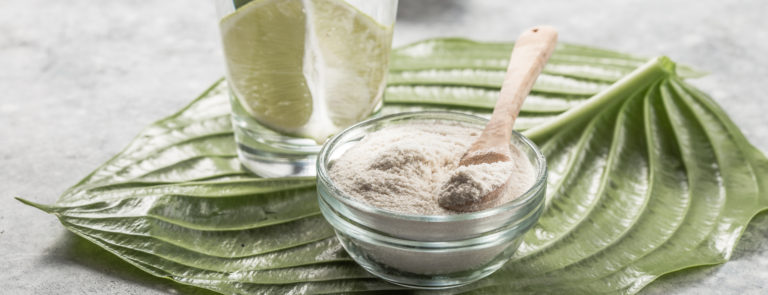10% off £35
How collagen helps with healthy joints & bones

Your joints and bones are full of collagen, so could collagen-containing supplements help keep them in good condition?
If so, what are the best collagen supplements for joints and bones?
What is collagen, and where is it found?
Collagen is the most abundant protein in the human body.
Collagen is the protein that ‘glues’ our body together – the word collagen even comes from the Greek word for glue, ‘kólla’.
Collagen gives strength, structure, and elasticity to our skin, bones, muscles, tendons, cartilage, and blood vessels, and is found in most of the body's tissues.
Collagen is made up of long chains of tightly bound amino acids. The collagen structure looks like a dense rope of fibres.
It’s this fibrous structure that makes it strong enough to support hard tissues like bone and elastic tissues such as cartilage, ligaments, and tendons.1
The body can make its own collagen from nutrients including protein, vitamin C, and copper. You can also find collagen in meat, bone broth, and gelatine.
How is collagen related to joint pain and bone loss?
Joint pain and loss of bone density are common, especially in older adults.
Cartilage damage is a frequent cause of joint pain.
Cartilage – the tough, shock-absorbing tissue which cushions bones inside your joints – is prone to wear and tear in older age. When the protective layer of cartilage is damaged, joints can be stiff, inflamed and painful.2
Bones naturally lose density in later life, especially in women following the menopause.3
To make matters worse, we stop producing collagen as rapidly as we get older. This is one of the main reasons for visible signs of ageing including skin wrinkles and sagging, as well as increased joint stiffness and loss of bone mass.4
How does collagen help?
As collagen is one of the main materials our joints and bones are made from, it might seem obvious that a little extra collagen can help maintain their health.
However, it’s not that straightforward, as collagen from foods isn’t directly absorbed as collagen into our bodies.
Collagen rich foods are digested by the body as a protein and broken down into a range of different amino acids.
From these amino acids, and with help from vitamins and minerals e.g. vitamin C, your body produces its own collagen. This process is called collagen synthesis.5
Is hydrolysed collagen best?
To best absorb collagen taken orally (swallowed in the form of a capsule, powder, or drink), collagen must be extracted from its original source, then broken down into shorter chains of amino acids, with molecules small enough for us to absorb through our gut.
This process of dissolving the collagen into smaller molecules is known as hydrolysation.
However, the effects of collagen which hasn’t been hydrolysed has been studied in relation to joint and bone health, and little difference has been found between the effectiveness of hydrolysed and non-hydrolysed.6
Which collagen is best for joints?
There are three main types of collagen present in the body.
Cartilage is primarily made up of type II collagen, a tough variety made from animal cartilage which gives cartilage the strength to support joints.
Therefore, type II collagen is the type recommended to help with joint issues.7
While collagen can’t repair or ‘grow back’ lost cartilage, studies have shown some improvement in flexibility following supplementation with both hydrolysed and non-hydrolysed collagen.
One 2013 study published in the Journal of the International Society of Sports Nutrition found that 40mg of non-hydrolysed type II collagen daily led to improved knee joint extension and reduced discomfort during strenuous exercise.8
A separate 24-week study in the USA in 2008 found that joint discomfort in athletes was improved after they took a dietary supplement of hydrolysed collagen.9
So, for joint health, choose a type II collagen supplement.
Which collagen is best for bones?
You’ll know how vital calcium is for healthy bones, but collagen is essential, too. As the main ingredient in bones, type I collagen is what gives bones their strength.10
A study in Germany published in the journal Nutrients reported that supplementation with hydrolysed collagen significantly increased bone mineral density in the post-menopausal women who participated in the study.
More research is needed, but this is promising news for adults who are concerned about their bone health.11
For bone health, choose a type I collagen supplement which is hydrolysed, to promote optimal absorption.
- https://www.ncbi.nlm.nih.gov/books/NBK21582/
- https://www.nhs.uk/conditions/cartilage-damage/
- https://medlineplus.gov/ency/article/004015.htm
- https://www.ncbi.nlm.nih.gov/pmc/articles/PMC1606623/
- https://www.sciencedirect.com/topics/medicine-and-dentistry/collagen-synthesis
- http://blog.arthritis.org/living-with-arthritis/collagen-supplements-helpful-arthritis/
- http://blog.arthritis.org/living-with-arthritis/collagen-supplements-helpful-arthritis/
- https://www.ncbi.nlm.nih.gov/pmc/articles/PMC4015808/
- https://pubmed.ncbi.nlm.nih.gov/18416885/
- https://www.ncbi.nlm.nih.gov/pmc/articles/PMC2577747/
- https://www.ncbi.nlm.nih.gov/pmc/articles/PMC5793325/














